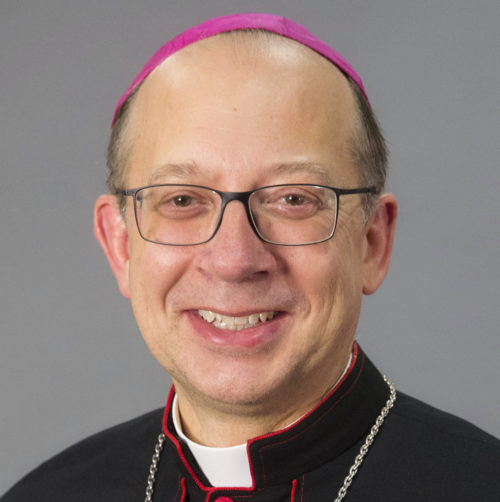Acknowledging the “extraordinary measures” people need to take in order to remain physically healthy during the coronavirus pandemic, Bishop Barry C. Knestout told the people of the Diocese of Richmond that they need to be mindful of their spiritual health.
“We also confront a spiritual danger — one of fear, anxiety, anger, frustration and possibly even despair. This danger is caused by our interior response to an external threat to our life, culture, work and home,” he said during his homily at a private Mass livestreamed from the Cathedral of the Sacred Heart on March 22. “As we confront this threat to our well-being, it is important to remember that we must attend to our spiritual as well as our physical health. Both are interrelated and one affects the other.”
The bishop, who had been in self-isolation since March 14, spoke about the conflict between the “natural desire in times of uncertainty to draw close to one another” in a communal setting, and yet to remain physically distant from one another due to COVID-19.
“This conflict between the attraction of love and the caution of fear creates tension within and anxiety,” he said. “What is appropriate and what is an overreaction? What is prudent and what is complacent? What is the remedy then to this emotional and spiritual conflict within us?”
At the time of the Mass, Bishop Knestout has not received the results of his March 18 COVID-19 test so he did not celebrate the Mass but delivered his homily from a side chapel in the cathedral. On March 23, he learned that he had tested negative for the coronavirus. The Mass was concelebrated by the diocese’s vicar general, Father Michael Boehling, and the cathedral rector, Father Anthony Marques.
Bishop Knestout said that distancing does not exempt people from works of charity.
“Amid calls to distance, we must still remember charity and the command to respond to the needs of the vulnerable, weak and the poor,” he said. “Isolation can be as dangerous to life as a virus is. Let’s not allow the anxiety about the virus to keep us from expressing charity to those in need.”
Bishop Knestout said that technology provides people an opportunity to “ensure charity, even at a distance.”
“Each of us can plan to contact 10 people each day, to encourage them, listen to them, find out if they have any needs, if they are struggling with any difficulties,” he said. “Once we know of these needs, with courage we should act, to seek out ways to help and remedy their need. We can do so with right judgment, with prudence.”
Bishop Knestout said the key to all that the faith community does is prayer.
“In a time when we are fearful of a new virus threatening lives, and we need to socially distance ourselves from one another to safeguard each other’s health, our faith allows us to see this time of isolation and anxiety, as an occasion for drawing close to God in solitude and prayer,” he said.
The bishop, who was tested at St. Mary Hospital, Richmond, expressed gratitude to all of the first responders for their work during the crisis.
“Whether they be health care professionals or law enforcement personnel, paramedics or firefighters, they risk their lives every day for our safety and for the common good,” he said. “We have an enormous debt to them and assure them and their families, who sacrifice with them, of our prayers, our support and our deep gratitude.”
Prior to the conclusion of Mass, Bishop Knestout consecrated the diocese to the Sacred Heart of Jesus and to the Immaculate Heart of Mary.

